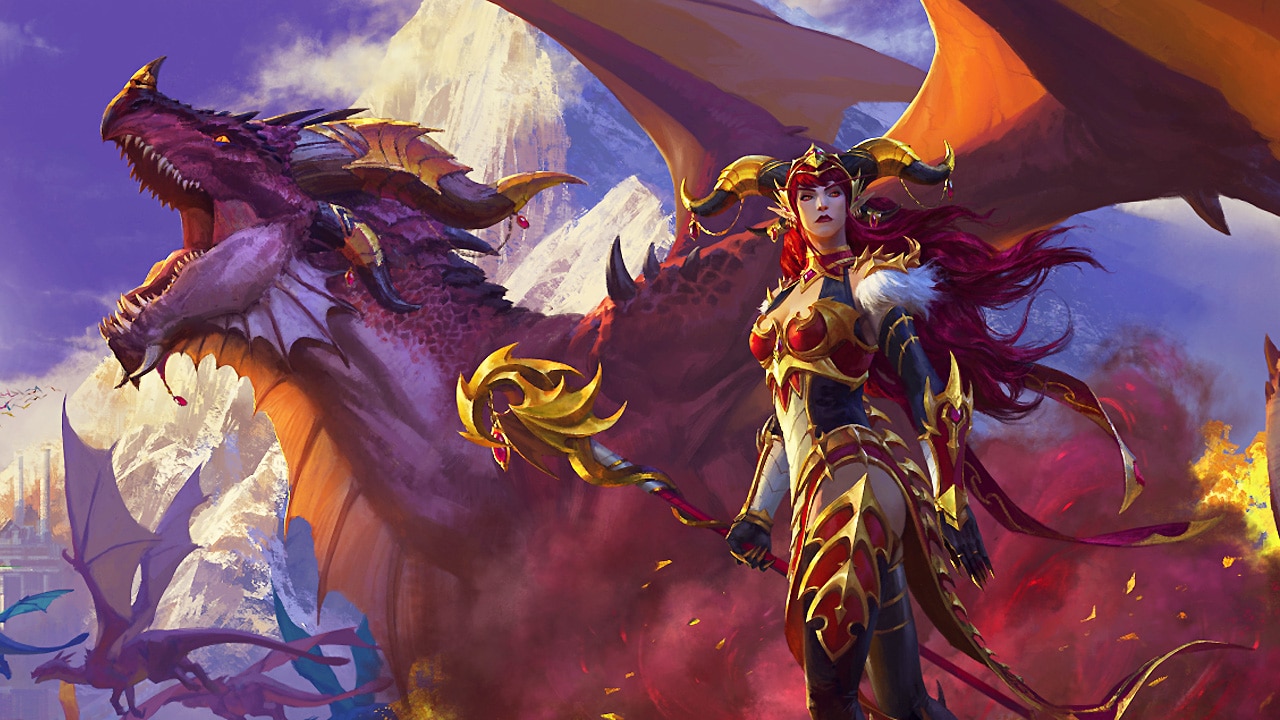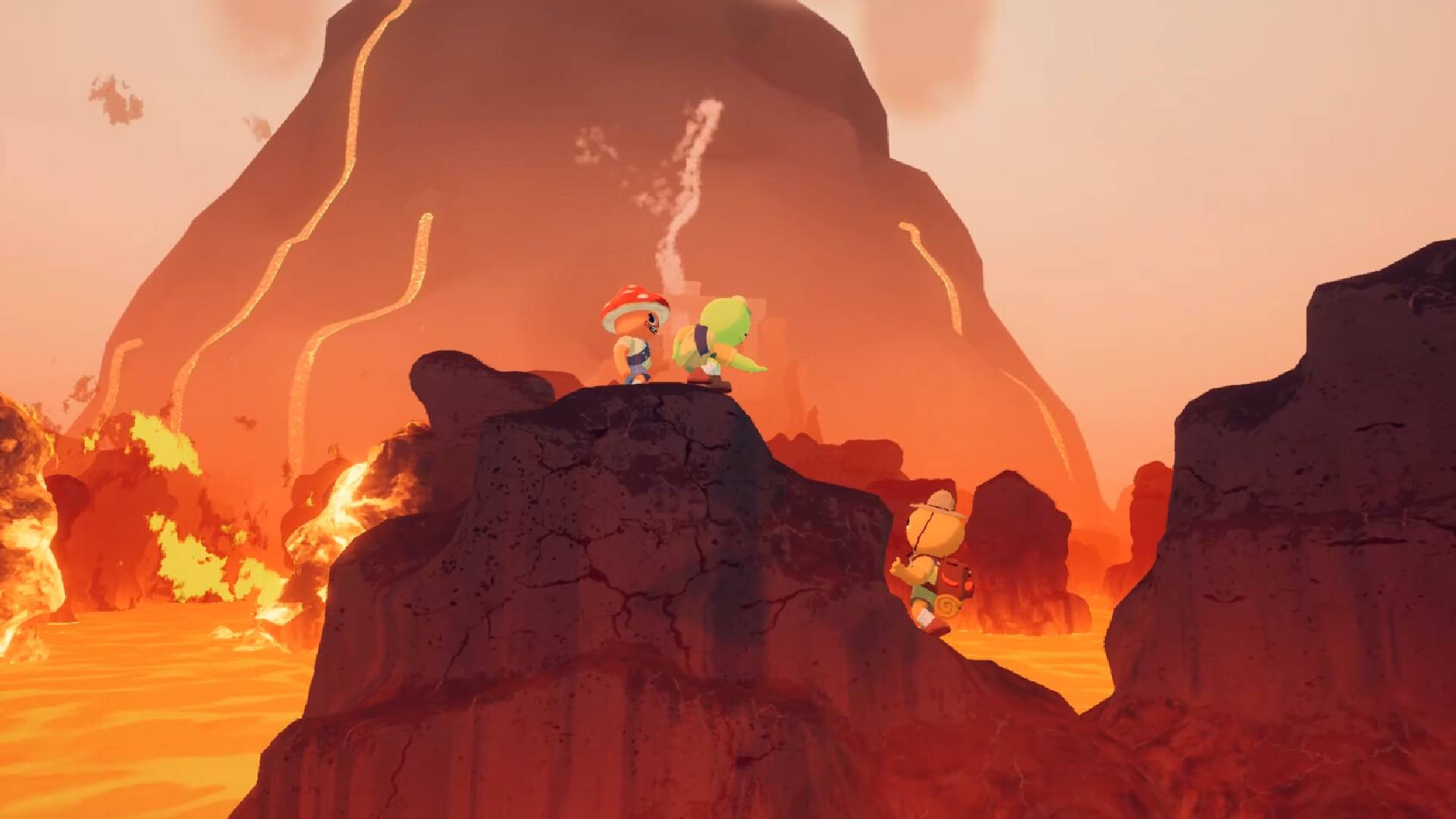
World of Warcraft: Dragonflight is a promising new foundation for a very old MMO.
(Image credit: Activision Blizzard)
What is it? The latest expansion to the most significant MMORPG of all time.
Expect to pay: $50
Developer: Blizzard
Publisher: Activision Blizzard
Reviewed on: Windows 10, Nvidia GeForce RTX 2070 Super, Intel Core i7-9700, 16GB RAM
Multiplayer? You could say that, yes.
Link: Official site
It is strange to play a version of World of Warcraft that obeys the laws of physics. My dragon swoops downwards through the snowy peaks of the Azure Span; slowly building up momentum until Azeroth itself seems to fade from my periphery. I pull the reins up, the wyrm obeys, and suddenly we’re soaring over the Isles at speeds once unheard of in this ancient MMO. No gryphon or hippogryph—no flight path, zeppelin, or warship—holds a candle to the freedom of movement offered to players in Blizzard’s ninth WoW expansion. Rather than a bundle of one-off experiments or a heaping spoonful of new raids and shinier loot, Dragonflight positions itself as something of a new foundation for a very old videogame. In both its fiction and its infrastructure, the expansion is a soft landing spot for new players.
For Dragonflight, Blizzard has focused much of its attention on reworking outmoded, atrophying systems, while sprucing up some of the gameplay trappings that had been left to rot back in 2004. There have been more exciting chapters in World of Warcraft’s lifespan. You will not find the pure, white-hot zeitgeist of the Icecrown siege on the horizon here, but perhaps you’ll find something even better: genuine enjoyment of Blizzard’s finest product after a lengthy spell in the wilderness.
The last expansion in WoW’s chronology took us to the Shadowlands, an eldritch plane of undeath scarcely explored in the game’s lore, dominated by a bevy of new characters that possessed no verve or charisma. (Looking at you, Zovaal.) The Dragon Isles, which serve as the setting for Dragonflight, are a distinct return to bright high-fantasy. No, Blizzard is not gratuitously retconning established Warcraft 3-era precepts for a cynical shot of nostalgia, (thank god there is no sign of Arthas, at least thus far). Instead, after a sizable time skip within the overarching WoW chronology, the Alliance and Horde have settled into a truce and are jointly exploring ancestral land of the immortal dragonkin who haven’t mattered much in Azerothian lore in quite some time.
Where the Shadowlands were choked with austere grays and alien blues, the Dragon Isles are pure technicolor excess. A tropical, untamed intensity permeates the land; it’s pockmarked by splashes of molten lava, ripe swathes of greenery, and luminescent tundras. Blizzard is clearly aiming to recapture the childlike Tolkein-ish sublimity of a blank map and buried treasure—dragons and all of their hoards—rather than, say, the high-concept crucible of heaven and hell.
To the skies
(Image credit: Luke W. / Activision Blizzard)
WoW is asking us to be dexterous with our mouse. I never thought I’d see the day.
The marquee new feature is WoW’s first race/class combo. The Dracthyr are pitched as an ancient race of humanoid dragonfolk (who, if we’re being honest, have a distinct fursona bent) that have been awakened alongside the rediscovery of the Dragon Isles. They can play as exactly one class—The Evoker—who can opt for a healing or a DPS build, depending on where you slot your talents. As the name implies, Evokers call upon the primal energies of their brood to deliver massive payloads of damage, with abilities often borrowed from all the famous dragon battles we’ve endured in Warcraft history. (For instance, if you fancy yourself a caster, you’ll have access to the devastating Deep Breath, which crushed countless raid groups in Onyxia’s Lair many years ago.) The Evoker doesn’t fundamentally rewire WoW’s aging combat system, but the abilities that pop up on your toolbar do empower player agency a bit more than, say, the Arms Warrior I’m currently piloting on Wrath of the Lich King classic servers.
Here’s what I mean: A number of the spells in the Evoker’s arsenal must be charged up and released at the right time for max damage, as if you’re stringing up a bow-and-arrow in Tomb Raider. What that implies, for you and I, is that we must be precise. Our fireballs do not automatically home in on our targets like heat-seeking missiles, and our Deep Breaths must be painted along a narrow path to be effective. At last, some of the considerations once exclusive to Warcraft’s PvP modes—positioning, hand-eye-coordination—are being emphasized in the game’s leveling experience. I have been spamming macros and popping procs for so long in Azeroth that the slightest dash of nuance on my action bar felt like a downright revolution. The bones of WoW are made of plodding auto-attacks and dice rolls, but in Dragonflight, Blizzard has proven that they’ve found a bit more wiggle room in those staid parameters—a way to keep us active during our latest slate of daily quests.
There’s really no better example of that emphasis than the newly implemented dragonriding skill, which—it bears repeating—is so radically different from WoW’s other dalliances with flying mounts that it’s almost like comparing a Ferrari 911 to a Model T. The proto-drake your character receives in The Waking Shores comes with its own custom toolbar; one button causes it to fire up the afterburners and dart forward through the air, another yanks it towards the sky, capable of scaling a mountain in a split second. The flying creatures we piloted in the past moved around the world like helicopters, tirelessly floating as we queued for our next mythic dungeon. In Dragonflight nobody has that luxury. Idle in the sky, and your dragon slowly loses speed before spiraling back down to earth. So, to truly excel as a dragonmaster, one must borrow the sort of gameplay precepts they learned in Forza Horizon. WoW is asking us to be dexterous with our mouse. I never thought I’d see the day.
(Image credit: Luke W. / Activision Blizzard)
You also get your first dragon-riding mount very early into the expansion’s campaign, which is a radical departure from previous expansions. (Lately, Blizzard has reluctantly doled out the ability to fly as an end-game perk.) That has allowed the studio to be far more varied in the geographic layout of the Dragon Isles than it was during Shadowlands, Battle for Azeroth, and even Legion. This continent is studded with citadels nestled in massive mountain chains; Tyrhold, the linchpin fortress on the islands, brings to mind Skyrim’s Solitude for its splendorous inaccessibility. You will need to master the skies to experience Dragonflight in the way it’s intended, and thankfully—despite a few creaks and bumps—I quickly fell in love with the blazing pace and delicate control of my brand new steed. The best part? To unlock more dragon riding abilities, you’ll need to collect the tokens hiding out in hard-to-reach places around the map. It is a Banjo-Kazooie collect-a-thon in the middle of a WoW expansion. I can’t help but adore the audacity.
Rebirth
If WoW’s trend toward idle-game automation has turned you off in the past, you won’t find what you’re looking for on the Dragon Isles.
Dragonflight’s other modernizations are much more grounded. Blizzard, at long last, has returned a traditional talent tree to WoW, doing away with the uber-simplified three-pronged scheme introduced back in Mists of Pandaria. It feels really good to level up and slot a point into a matrix, like an open diffusion of ideas between Classic and retail, which I hope continues in the future. It’s also given us a revamped mini-map, and fully customizable action frames—all of which borrow heavily from the sort of mods people were using to augment their WoW client since its very inception. I’m a pretty unfussy Azerothian, so I’m still rolling with my two basic hot bars and some side-paneling. But if you are the sort of gamer who is way more interested in staring at your cooldown timers and damage integers than the action on screen, Blizzard has your back. These aren’t the most exciting new wrinkles in expansion history, but it’s important work—a good foundation for the MMO as it enters its third decade of existence, if you can believe it’s been that long.
Blizzard has also completely rebuilt its professions tab from the ground up, which might be the single most overdue revamp in the game’s long history. The outrageously rote cycle of right-clicking an ore vein and gathering the loot is no more. Now, if you’re mining, or skinning, or brewing up potions, you’ll need to navigate a number of statistical gullies, like “inspiration” or “multicraft,” that will affect your yields. The tableau also includes distinct specialization tracks, talent thresholds, and best of all, profession-specific gear, which allows for far more creativity and nuance than the one-track grind to mastery of the vanilla days. One of the first things I did with my blacksmithing Dracthyr was to forge a superior hammer for my anvil, which was automatically equipped in its own bespoke tab whenever I wanted to get down to business. This marries well with WoW’s new work order system, which allows players to list whatever they want crafted, and put up the resources to make it so. For the first time in over a decade, I’m actually excited to squeeze out some skill points in Azeroth.
But make no mistake: Dragonflight is still a modern WoW expansion, and if you are coming back to retail in hopes that Blizzard has opted for a full-throated return to its ancestry—where you must eat and drink before mob pulls, and group up for elite quests, and alt-tab into Wowhead in order to locate where, exactly, you need to go to find Mankrik’s Wife—you will be disappointed. The dungeons I’ve explored remain brainless and depressing, with none of the emergent D&D flair of some of the game’s earliest, and most immersive gauntlets. Nobody speaks as we teleport, via group finder, into the instance, the bosses all die in fiery AoE, and loot is automatically sorted (and occasionally blessed with a rarity upgrade) before we are returned to our native servers to continue our journey to the level cap. If WoW’s trend toward idle-game automation has turned you off in the past, you won’t find what you’re looking for on the Dragon Isles.
(Image credit: Luke W. / Activision Blizzard)
It’s a strange dichotomy. Dragonflight is beautiful and packed with all sorts of wild new ideas for the MMO, but when I examine my history with WoW, it’s clear that the reason I’ve sunk progressively less time into each of its expansions is that the game now seems to prioritize efficiency over immersion. I don’t need to read the stats on my gear anymore. Everything on the Isles has an item level listed right below its name. If it’s higher than whatever I’m currently wearing, I can right click it, and my damage level increases by an imperceptible degree. I still don’t feel like I’m playing WoW in the same way I did 15 years ago.
Here’s an example: One early quest in Dragonflight is a loving callback to one of the greatest leveling challenges in the game’s history, The Burning Crusade’s Ring of Blood. You and four friends step into a makeshift fighting pit and take on an escalating series of gnarly gladiators, before finally claiming a hard-fought victory at the end of the chain. It was difficult, dangerous, and always hard to find a group up for the challenge. But in Dragonflight, when I ventured to the arena in the Ohn’Ahran Plains ready for primetime, all of the servers merged together, and a loose confederation of sharded, transient souls made quick work of the baddies. The experience boost was fantastic, as was the new gear, but the experience was undeniably wooden. I’ve made peace with the reality that modern WoW won’t ever replicate the thrills of the Azeroth I was nursed on a long time ago. But if you’re a grognard like me, who’s still playing this MMO after two decades, an expansion like Dragonflight can’t help but be a tad bittersweet. You can’t go home again, but you can get pretty close.



